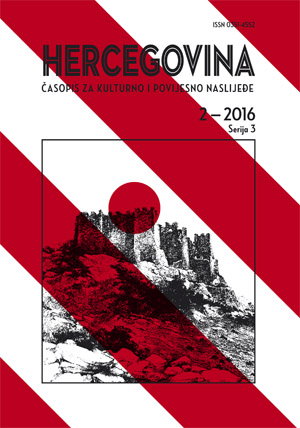Izbori i imenovanja biskupâ u Hercegovini u doba austro-ugarske vladavine (1878.-1918.) na primjeru biskupa Paškala Buconjića*
Election and nomination of bishops in Herzegovina during the Austro-Hungarian rule (1878-1918), the case of Bishop Pascal Buconjic
Author(s): Petar VrankićSubject(s): Christian Theology and Religion, History, Cultural history, History of Church(es), Economic history, Ethnohistory, Political history, Social history, 19th Century
Published by: Filozofski fakultet Sveučilišta u Mostaru
Keywords: Herzegovina; Bishop Pascal Buconjic Apostolic Vicariate in Herzegovina; the Diocese of Mostar-Duvno; the Diocese of Trebinje-Mrkan; the Convention between the Holy See and Austria-Hungary; the Apostol
Summary/Abstract: Election and nomination of bishops in the Catholic Church has always been a very complex and politically sensitive issue. With the occupation of Bosnia-Herzegovina in 1878 and the introduction of new legal, economic and administrative regulations, Austria-Hungary established new relations between the state and religious communities in Bosnia-Herzegovina. The Convention with the Ecumenical Patriarch of Constantinople of 28 March 1880 regulated the relations with the Orthodox Church in Bosnia-Herzegovina. After two years of very intensive negotiations between Vienna and the Holy See a similar solution was reached for the Catholic Church in Bosnia-Herzegovina. On 8 June 1881, the Convention between the Holy See and Austria-Hungary was signed in Rome, a document regulating the state-church relations in the Catholic Church in Bosnia-Herzegovina. In two other similar treaties, Austria-Hungary regulated the relations of the state with the Muslim and Jewish communities in Bosnia-Herzegovina. The Conventions between Austria-Hungary and the supreme representatives of religious communities in Bosnia-Herzegovina, as well as the contracts with other religious communities in different countries of the Monarchy, presented a kind of international agreement of political, legal and religious character and were an important feature of the legacy of the Austro-Hungarian Monarchy.The Convention between the Holy See and Austria-Hungary brought along many political and canonical changes in comparison to four-century long Ottoman occupation and strong Islamic oppression symbolized in the Ahdnama of Milodraz from 1463 as well as the rule of missionary canonical law, whi¬ch was in force in Bosnia-Herzegovina until 1878 or 1881. The privilege of appointing Catholic bishops obviously deserved a special place in the Convention. The privilege of election and nomination of bishops in Bosnia-Herzegovina, according to the spirit of the Convention of 8 June 1881, was courtesy of Pope Leo XIII to "His Majesty" Francis Joseph, Emperor of Austria and King of Croatia-Hungary: Il Santo Padre.... concede alla stessa Maestà Sua il privilegio di nomina dell'Arcivescovo e dei Vescovi nella Bosnia e nell'Erzegovina. This short paper presents the concrete rule of state law and canonical law in the process of the election and appointment of the first bishop in Herzegovina, Pascal Buconjic OFM. In his triple function of an Apostolic Vicar in Herzegovina, a Bishop of Mostar-Duvno and finally an Apostolic Administrator of Trebinje-Mrkan, which he held successively, the state-church character of the reception and the realization of the Convention in Herzegovina were most clearly manifested. Buconjic, pleno sensu, a church man and a monk, thanks to his reputation and skill, enjoyed the position of trust with the State Government (Landesregierung) in Sarajevo, the Common Ministry of Finance in Vienna and the Emperor himself. Consequently, Buconjic as a bishop realized almost all his plans with the Sta¬te, and the Austro-Hungarian Monarchy considered him as an excellent partner to promote its ecclesiastic and state plans with the Catholic Church in Herzegovina. The author does not discuss, on purpose, the human, spiritual, religious, sacerdotal, pastoral and Episcopal characteristics of Bishop Pascal Buconjic, especially not his relation to the diocesan clergy and is happy to leave this task to other observers and investigators. He focuses on the interesting and successful profile of a Herzegovinian Franciscan Buconjic, which very quickly sets him apart from the nostalgic times of Franciscan exclusivism, based on privileges of the Ahd-nama of Milodraz but maintains all privileges of the Holy See (monumenta, privilegia et iura specialia franciscana) and other privileges of the Padişah in Istanbul that laid the foundations for a new and stronger exclusivism of future Franciscanism in Herzegovina. It is a contradiction that the Convention between Holy See and Austria-Hungary, which had so greatly promoted the Franciscanism in Bosnia and Herzegovina, was so strongly denigrated by Franciscan historiography in this country.
Journal: Hercegovina. Časopis za kulturno i povijesno naslijeđe (Do 2018)
- Issue Year: 2016
- Issue No: 2
- Page Range: 109-140
- Page Count: 32
- Language: Croatian

